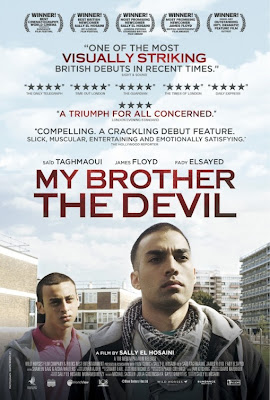Via NOBODY'S WATCHING (Nadie nos mira), the new Latin American co-production directed and co-written by Argentine filmmaker Julia Solomonoff, audiences are going to see one of the year's best performances so far by a male actor. This would be Guillermo Pfening, another Argentine who has already amassed some 67 credits at this point in his nearly 40-year life. Mr. Pfening, shown at right and below, fully and richly embodies his central character, Nico -- a relatively successful actor in his home country, who has come to New York City to both further his career and get away from his controlling lover, who happens to also be the director/producer of the successful television series in which Nico plays a role. (Nico's character has been put into a coma, while the actor decides what to do next.)
Señor Pfening (The German Doctor) gives the kind of performance that ought to win a bunch of awards for the depth, clarity and warts-and-all reality the actor brings to it. It won't, of course, because it's not "showy" enough or full of chances for over-the-top (melo)drama. Folk who appreciate a genuine, full-out performance, however, will be glad they went out of their way to catch this one.
For her part Ms Solomonoff (shown at left), along with her co-writer, Christina Lazaridi, brings an unhurried, loose and naturalistic style to the film, working the exposition into the situation, while bringing character to the forefront and thus avoiding the kind of melodrama that often accompanies some of the situations shown here. The filmmaker allows us to slowly but surely understand the kind of man our Nico is, along with the characteristics that alternately control him: pride, insecurity, kindness, love, desire, ambition and lots more. Via particularly well-chosen situations involving everything from employment to friendship, auditions to sexual encounters, baby-sitting to simple relaxation (in which the director and her star make us privy even to thought processes), a full-bodied character and the movie that surrounds him come to life.
To make ends meet, as he waits for the film to begin production for which he has been hired, Nico takes odd jobs -- from bus boy to taking care of a good friend's infant (above and below), the latter being a job for which he is not well-equipped but which, because he's a decent and caring guy, he manages to quickly learn.
The bond that forms between Nico and his little "charge," as well as between him and the Hispanic nannies he meets in the park, are just two of the many surprises and pleasures offered in Nobody's Watching.
The supporting cast is well-chosen and appealing (that's Elena Roger, above, as Nico's best friend in the big city), with each actor finding the truth of his/her character quickly and effectively. Nico's peculiar combination of ambition and self-reliance coupled to a nearly equal dose of self-destructiveness makes this character oddly appealing and very believable.
The movie's interesting "take" on its immigrant story also makes it timely yet unusual in its choice of the type of immigrant we see -- his "class," level of education and the like -- even as he, like so many others, sees America as a stepping stone to a better life. (At least our Nico has a country he can return to without the possibility of being tortured and/or killed because of that return.)
One of the movie's most interesting sections involves a reunion between Nico and his friend (played by Marco Antonio Caponi, above, left) who stars in that popular TV soap opera in which Nico also appeared. Both men want to impress each other, but Nico goes far beyond what's necessary. How his friend responds, once he discovers Nico's ruse, provides one of the film's more tender and appealing moments.
When we finally meet Nico's ex-lover, Martín (Rafael Ferro, above, left) and begin to understand the control coupled to sexual appeal the latter offers, more puzzle pieces fall into place. By its conclusion, the film has grown both broader and deeper than we expected going in, even as we feel that Nico may have finally -- if just barely -- turned the corner into "growing up."
From FiGa Films and Cinema Tropical, Nobody's Watching opens tomorrow, Friday, September 8, in New York City at Film Forum. Elsewhere? Nothing is scheduled just now, but if I learn of further openings, I will post them here. Or, if you're not in NYC, maybe wait for the eventual DVD/streaming options.
Note: Director Julia Solomonoff will appear
in person at NYC's Film Forum
at the 7pm show on both September 8 and 9.






















































